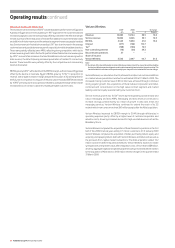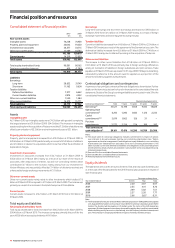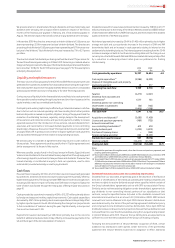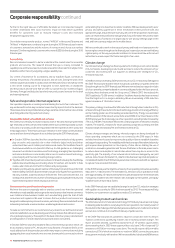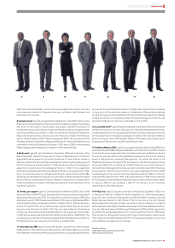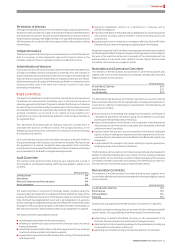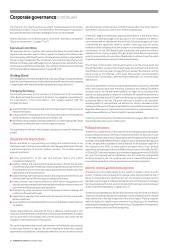Vodafone 2010 Annual Report Download - page 48
Download and view the complete annual report
Please find page 48 of the 2010 Vodafone annual report below. You can navigate through the pages in the report by either clicking on the pages listed below, or by using the keyword search tool below to find specific information within the annual report.
46 Vodafone Group Plc Annual Report 2010
Corporate responsibility continued
Further to the rapid take-up of affordable handsets we commissioned research
to better understand their socio-economic impact in India which quantified
benefits for customers such as reduced transport costs and increased
employment opportunities.
Our mobile money transfer product, named “M-PESA” in Kenya and Tanzania and
“M-Paisa” in Afghanistan, continued to grow during the 2010 financial year in terms
of customers, transactions and the volume of money moved. Across our markets
there are 13 million registered customers who moved US$3.6 billion during the 2010
financial year.
Accessibility
We commissioned research to better understand the market sizes for accessible
products and services. The research showed that age is closely correlated to
capability loss and that we need to consider propositions that cater for multiple minor
disabilities rather than only targeting a single capability loss.
Our centre of excellence for accessibility, led by Vodafone Spain, continues to
develop the portfolio of accessible products and services. During the year a new
wireless loopset was trialled in collaboration with Nokia and Oticon and we launched
a new online training course for employees to raise awareness on disabilities
and the products and services that we offer our customers. Our markets in Egypt,
Germany, Portugal and Italy also launched new products and services for the deaf
and hearing impaired.
Safe and responsible internet experience
Our reputation depends on earning and maintaining the trust of our customers. The
way we deal with certain key consumer issues directly impacts trust in the business.
These issues include responsible delivery of age-sensitive content and services, mobile
advertising and protecting customers’ privacy.
Responsible delivery of content and services
We continue to be heavily involved in industry work in this area. Having implemented
age-restricted content controls in the markets where such content is provided our work
is focused on providing a safe and responsible internet experience when using new
media applications. These have particular relevance to the mobile communications
sector and have formed a key part of our activities during the 2010 financial year:
In October 2009 we launched the first comprehensive website to help parents
play an active and essential role in their children’s digital world and better
understand their use of mobiles, and online social media. The Vodafone Parents’
Guide (www.vodafone.com/parents) offers up-to-date guidance on challenging
issues such as children’s excessive use of technology, managing their reputations
and online identities in social media, safe access to location-based technology,
cyber-bullying and the risks of meeting strangers online.
Together with other industry partners we have continued to develop the Teachtoday
website (www.teachtoday.eu) providing advice for teachers and students to help
create a safer online environment for children and young people.
Vodafone continued to be a board member of the newly formed UK Council for Child
Internet Safety (‘UKCCIS’). Board members include senior figures from government,
industry, charities, academia and law enforcement. The board sets direction at a
strategic level and there are a number of working groups including the industry and
expert research panels in which we play an active role.
Consumer privacy and freedom of expression
We know that users increasingly wish to exercise control over how their personal
information is made available and recognise the need to ensure that internet commerce
over mobile and new business models, such as advertising, gains the trust of both
consumers and regulators. We seek to ensure that our products and services are
designed to address privacy risks and concerns, particularly those associated with social
networking and media, as well as location-enabled applications and services.
To make our commitment to our customers’ privacy clearer to our staff, customers and
external stakeholders, we are developing a set of core principles that will become a part
of our global privacy policy. These will form the basis of all of our privacy standards and
provide guidance on a wide range of privacy issues across our business.
In October 2009 we launched Vodafone 360, a new internet proposition which can
be accessed by mobile or PC. Among the many features of Vodafone 360 is a rich
visual address book that provides users with many ways to communicate including
aggregating their social networks into one view, showing who’s connected to whom
and enabling them to share their locations. Vodafone 360 was developed with users’
privacy and safety uppermost in mind: mechanisms which promote safe and
appropriate usage, and protect users’ privacy, are core to the proposition. In particular,
users can review their prof ile and manage what, if any, information they wish to share
with their groups of contacts on a single, easy-to-use ‘privacy settings’ page on the
web, and from a privacy widget on the mobile device.
We have continued to work on the issues of privacy and freedom of expression in the
human rights context throughout the financial year. In particular, we are now finalising
a global policy on the way we provide assistance to Government law enforcement
authorities to ensure respect for the human rights of our users.
Climate change
Our climate change strategy has three key elements: limiting our own carbon dioxide
(‘CO2’) emissions, developing products and services to reduce the emissions of our
customers and working with our suppliers to develop joint strategies for CO2
emissions reduction.
In 2008 we announced that by 2020 we will reduce our CO2 emissions by 50% against
the 2007 financial year baseline which included all operating companies within the
Group throughout the 2007 f inancial year. We have now restated our target to include
all of our operating companies based in countries obligated under the Kyoto protocol
including those that have joined the Group since 31 March 2007; this reduced the
2007 baseline by 73,000 tonnes. In addition, Vodafone Australia has been removed
from the target as it is no longer a subsidiary. We are now seeking a 50% reduction
against a baseline of 1.04 million tonnes.
The primary strategy to achieve the 50% reduction is through direct reduction in CO2
emissions through the evolution of network technology, investment in energy efficiency
and by making greater use of renewably generated electricity. Energy use associated
with the operation of the network accounts for around 80% of our CO2 emissions. In the
2010 financial year the total energy use of our operations, excluding India, increased by
7.7% to 3,278 GWh. This increase reflects the continued growth of networks in existing
markets. The total CO2 emissions for those operating companies covered by the 50%
reduction target decreased by 9%, to 0.94 million tonnes of CO2.
Climate change strategies and energy intensity targets are being developed for
those operating companies which are not covered by the 50% target. In India
activities have been focused on improving the quality of data to establish a baseline
and support target setting. The instability and limited coverage of the national electricity
grid requires diesel generation on the majority of sites. We are trialling the use of
onsite micro-renewable generation and the use of batteries as the main power source
to reduce diesel consumption in remote sites where there may be no access to the
electricity grid. The majority of our network sites in India are managed by our joint
venture, Indus Towers. Estimated CO2 data for India has been reported alongside our
consolidated totals for the 2010 financial year and we continue to work with our suppliers
to capture more accurate information.
In the 2010 f inancial year the total CO 2 emissions of our operating companies, excluding
India, were 1.2 million tonnes. The estimated CO2 emissions of our operations in India
were approximately 2.3 million tonnes which includes emissions from the network sites
managed by Vodafone and the network sites managed by third parties, principally
Vodafone’s joint venture, Indus Towers.
In the 2009 financial year we established a target to set joint CO2 reduction strategies
with suppliers accounting for 50% of relevant spend by 2012. The strategies will help
Vodafone, our customers or our suppliers to reduce CO2 emissions.
Sustainable products and services
The information and communications technology (‘ICT’) industry has a major role to play
in delivering wider benefits to society beyond its own operations. Our industry is part of
the solution to the challenge of climate change (www.vodafone.com/carbonconnections)
and can also contribute to more efficient delivery of public services.
In the 2009 financial year we published a report in conjunction with Accenture:
“Carbon connections: quantifying mobile’s role in tackling climate change”. The
report provided detailed, quantified assessments of 13 wireless opportunities
demonstrating that in 2020 these opportunities could save 2.4% of expected EU
emissions or €43 billion in energy costs alone. This would require a billion mobile
connections, 87% of which are machine-to-machine (‘M2M’), connecting one piece
of equipment wirelessly with another. We have established a dedicated M2M service


